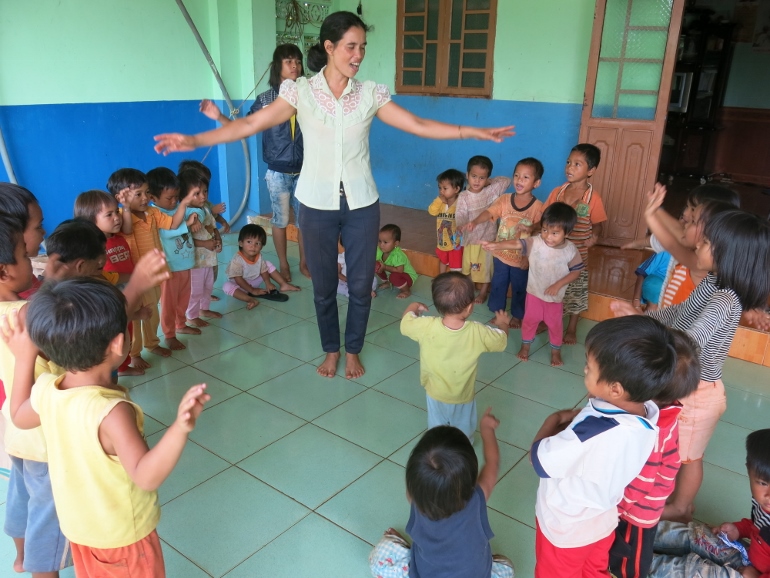
Ro Cham Hni, a teacher at the day care center, shows Jarai children how to perform a dance. (Joachim Pham)
Ro Cham Nunh had to carry her baby boy on her back while she worked in the rice fields last year because she had no one to care for her son. Nunh is Jarai, one of the ethnic minorities of Vietnam.
Nunh, 40, also had to stay at home frequently to look after her baby, who suffered from the flu, diarrhea, scabies and malnutrition. Because of her own lack of food, she was not in any shape to breastfeed the boy, her first child.
Her baby's health has improved since earlier this year, when she started to send him to Interfaith Charity Clinic, a Catholic church-run day care based in her village.
"Now my son is glowing with health and enjoying life after he has been nursed by teachers here," Nunh said in broken Vietnamese.
There are more than 50 distinct groups in the country, each with their own language and cultural heritage. The largest group, Kinh, makes up about 86 percent of the population, while those considered minorities range from less than 1 percent to about 2 percent. Because of a variety of factors, the overall standard of living for ethnic minorities lags seriously behind that of the Kinh majority.
The 6-year-old day care is staffed by six Jarai nurses who look after 70 minority children ages 18 months to 5 years. It also provides food, accommodations and lessons to some 6-year-olds who study at a local state-run kindergarten after their class.
"We give children two meals a day and teach them how to sing popular Vietnamese songs, to dance, speak Vietnamese and do exercises," said Ro Cham Hni, head of the center.
Hni said they also bathe the children, have them take a nap after lunch and teach them to use the toilets. Because of conditions at their own homes, the children are not used to the latter two.
"We also get them regular medical checkups," she said, noting that the children typically need to be treated for worms.
Hni, who uses her house as the center, said parents pay a monthly fee of only 100,000 dong (US$4.70) per child, but many parents can't afford to pay until the harvest season.
Local villagers grow coffee and rice for a living, but they don't have enough money to fertilize the crops and subsequently get poor harvests. This means generations of poverty.
"I am proud of my son, who is nursed at the center, although his monthly fee is a big problem with me," Nunh said.
She earns between 70,000 and 150,000 dong (US$3.30 to $7.10) a day as seasonal worker.
Traditionally, parents carry their babies on their back to the fields or let older children take care of younger ones at home while they are away working on farms. This creates less-than-ideal conditions, as children play on the ground and are left to feed themselves. They get dirty and are likely to be bitten by insects or infected by parasites and diseases affecting their skin, respiration and digestion.
Many are not taught to speak Vietnamese and find it difficult to communicate with others who are not of the same ethnicity. Minorities rarely go beyond their villages.
Hni said families here have four to nine children on average. Most women give birth at home, and many babies die of infection, diseases or malnutrition. Children have little opportunity to go to school.
Franciscan Br. Nguyen Dinh Phuc, who runs the center, said there are seven such day cares based at ethic minority villages in the central highlands of Gia Lai Province, which is home to at least a dozen ethnic minority groups. Each center serves 40 to 70 children for monthly fees ranging from 50,000 dong to 100,000 dong (US $2.35 to $4.70) per child.
He said the local church covers teachers' salaries.
"These centers aim to save children from malnutrition, keep them in hygienic conditions, teach them personal hygiene, communication skills and how to use toys and toilets -- obey rules," Phuc said. "They raise awareness of the responsibility of bringing up children."
He said the centers play an important role in giving preschool education to ethnic children, as their villages are in remote areas and have no state-run nurseries.
"After they finish their studies at our centers, they gain enough basic skills to attend local state-run kindergartens and elementary schools, where Kinh [majority Vietnamese] teachers work and Vietnamese is used compulsorily," he said.
He said the ethnic children who do not attend the church-sponsored day care centers are not able to finish elementary school because they lack language skills. They become socially isolated and express no wish to do something with their future, he added.
The centers only employ female teachers who are from the minority population and can relate to the children in their own language as well as teach them Vietnamese. They are college graduates or are trained at Catholic nurseries run by sisters.
A Quan is a Se Dang who has taught at a day care center at Ealuh Village for years. She said the center serves 60 children ages 1 to 4, many of whose parents could not afford to pay their school fees for the whole year, even though monthly fees are only 50,000 dong per child.
"We try our best to give the children opportunities to approach basic education and improve their life," she said. Her own mother gave birth to 10 children, but five of them died of childhood diseases, she added.
[Joachim Pham is an NCR correspondent based in Vietnam.]



